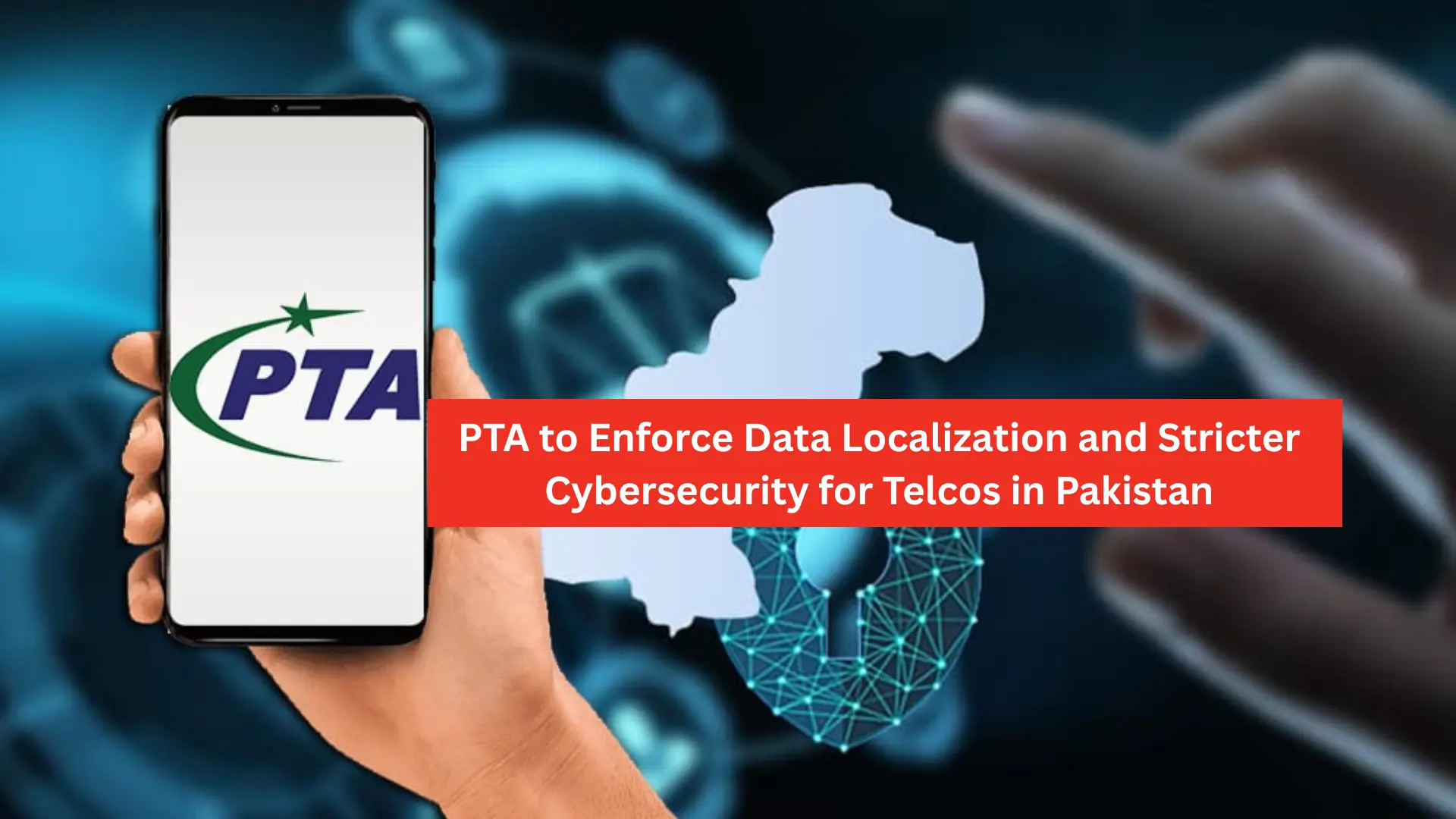PTA to Enforce Data Localization and Stricter Cybersecurity for Telcos in Pakistan. The Pakistan Telecommunication Authority (PTA) is set to introduce a new era of data protection and cybersecurity compliance for the telecom sector through its latest Critical Telecom Data and Infrastructure Security Regulations 2025 (CTDISR-2025).
These regulations aim to strengthen national cybersecurity resilience by localizing telecom data, enforcing Zero Trust Security Models, and mandating continuous monitoring and audits across all telecom operators, internet service providers (ISPs), and data centers operating in Pakistan.
With growing cyber threats targeting critical infrastructure, the PTA’s new framework ensures that Pakistan’s digital ecosystem becomes more secure, self-reliant, and aligned with global best practices.
What Are the CTDISR-2025 Regulations?
The PTA has finalized the Critical Telecom Data and Infrastructure Security Regulations 2025 (CTDISR-2025) and are currently open for public feedback before full implementation.
These regulations replace the earlier 2020 framework and introduce comprehensive cybersecurity standards designed specifically for telecom operators. The rules emphasize data localization, risk management, and incident response, ensuring that Pakistan’s telecom infrastructure remains protected from both internal and external threats.
Key Objectives of the CTDISR-2025 Framework
The new regulatory framework aims to achieve several critical objectives:
- Enhance national cybersecurity posture by enforcing strict compliance mechanisms.
- Localize sensitive telecom data within Pakistan’s borders to protect user privacy and sovereignty.
- Mandate corporate accountability by requiring CEOs and CISOs to oversee cybersecurity governance.
- Promote proactive risk management through audits, testing, and monitoring.
- Ensure rapid response to cyber incidents via PTA’s National Telecom Computer Emergency Response Team (nTCERT).
Mandatory Cybersecurity Requirements for Telcos
Under the new regulations, all telecom licensees—including mobile operators, ISPs, and infrastructure providers—will have to comply with detailed technical and administrative requirements to maintain operational and data security.
1. Data Localization
All telecom operators must store and process customer data within Pakistan. This move aims to minimize foreign data exposure, reduce dependency on external cloud services, and enhance national control over digital assets.
2. Establishment of Security Committees
Each telecom operator will be required to establish an Information Security Steering Committee (ISSC) chaired by the company’s Chief Executive Officer (CEO). The ISSC will oversee cybersecurity strategy, compliance, and emergency response planning.
Additionally, each operator must appoint a Chief Information Security Officer (CISO) responsible for implementing the PTA’s cybersecurity policies, conducting audits, and ensuring company-wide awareness.
3. Zero Trust Security Model
The CTDISR-2025 adopts a Zero Trust Security Model, which assumes that no internal or external entity is inherently trustworthy. Every access request—whether from a user, application, or device—must be continuously verified and authenticated.
This approach is aligned with international cybersecurity frameworks such as:
- ISO 27001 (Information Security Management Systems)
- NIST Cybersecurity Framework
- ITU Security Guidelines
4. Risk Assessment and Auditing
Telecom operators must perform:
- Annual risk assessments to identify system vulnerabilities.
- Vulnerability and penetration testing to evaluate defenses.
- Third-party security audits by PTA-approved cybersecurity firms.
Any weaknesses found must be rectified immediately, and detailed reports must be submitted to the PTA.
5. Incident Reporting and Response
The regulations introduce strict timelines for reporting cybersecurity incidents:
- Critical or high-severity incidents (e.g., hacking, data breach, or ransomware attack) must be reported to nTCERT within 24 hours.
- A comprehensive incident report must be submitted within five working days.
This ensures timely coordination and national-level response to prevent widespread disruption or data compromise.
Control Over Foreign Software and Hardware
To mitigate potential espionage and supply chain risks, the PTA will have the authority to inspect, restrict, or ban any foreign software, hardware, or service deemed a national security threat.
This clause is particularly relevant in today’s geopolitical climate, where telecom infrastructure components sourced from abroad can be exploited for cyberattacks or surveillance.
By encouraging local alternatives and secure procurement practices, the PTA seeks to foster technological sovereignty and resilience in the country’s communications network.
Vendor and Supply Chain Security
Telecom operators will also be required to:
- Vet and monitor all vendors and contractors handling sensitive information.
- Enforce strict access control policies and multi-factor authentication.
- Implement real-time intrusion detection systems (IDS) and security information and event management (SIEM) tools.
- Maintain comprehensive data logs for traceability and compliance verification.
These measures will minimize risks arising from third-party integrations, foreign partnerships, and outsourced IT services.
Continuous Compliance and Monitoring
Compliance under CTDISR-2025 is not a one-time requirement. Operators must maintain ongoing monitoring, reporting, and improvement mechanisms, including:
- Continuous risk monitoring dashboards.
- Regular CISO-led security reviews.
- Mandatory employee training on cybersecurity hygiene.
- Real-time incident management systems integrated with PTA’s monitoring tools.
Failure to comply may result in penalties, suspension of operations, or revocation of telecom licenses under the Pakistan Telecommunication (Reorganization) Act.
Public Consultation and Stakeholder Involvement
The PTA has uploaded the draft CTDISR-2025 document on its official website and invited public comments until November 7, 2025.
Telecom operators, cybersecurity firms, digital rights advocates, and the general public are encouraged to submit their recommendations through the online feedback form provided by the authority.
This participatory approach ensures transparency and inclusivity before the regulations are formally enforced.
Impact on Pakistan’s Telecom Sector
The introduction of CTDISR-2025 is expected to have a transformative impact on Pakistan’s telecom ecosystem.
1. Stronger National Security
By localizing data and limiting foreign dependencies, Pakistan can safeguard its citizens’ information and critical infrastructure from espionage and data theft.
2. Improved Consumer Trust
Telecom users will benefit from stronger data protection, encryption standards, and reduced privacy breaches—building trust in local operators.
3. International Recognition
Adoption of globally recognized frameworks such as NIST and ISO 27001 enhances Pakistan’s credibility in the international cybersecurity community.
4. Operational Challenges
While these rules ensure better protection, compliance may initially increase costs for telecom operators who need to upgrade infrastructure, hire qualified CISOs, and establish local data centers.
However, in the long term, these reforms will strengthen the telecom sector’s resilience against cybercrime and system outages.
Conclusion
The PTA’s Critical Telecom Data and Infrastructure Security Regulations 2025 (CTDISR-2025) mark a major milestone in Pakistan’s journey toward digital sovereignty and cybersecurity maturity.
By enforcing data localization, Zero Trust frameworks, and mandatory incident reporting, the PTA is ensuring that telecom operators become fully accountable for protecting customer data and national infrastructure.















